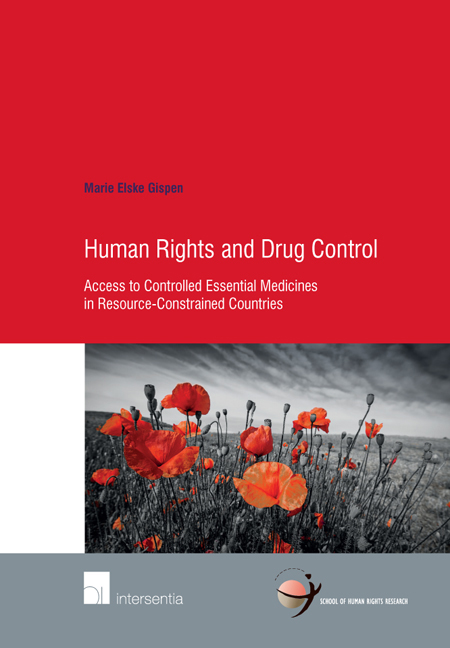 Human Rights and Drug Control
Human Rights and Drug Control Book contents
- Frontmatter
- Acknowledgements
- Contents
- List of Abbreviations
- Table of Instruments
- Table of Cases
- List of Figures and Tables
- Part 1 Concept and Problem
- Part 2 Normative Framework
- Chapter 3 Access to Controlled Essential Medicines and Aspects of Drug Control in Human Rights Law
- Chapter 4 In Search of a Normative Justification
- Part 3 Country Studies
- Part 4 Conclusions and Recommendations
- Appendix I Interview Protocol Uganda
- Appendix II Interview Protocol Latvia
- Samenvatting (Dutch summary)
- Selected Bibliography
- Index by Paragraph
- Curriculum Vitae
- School of Human Rights Research Series
Chapter 3 - Access to Controlled Essential Medicines and Aspects of Drug Control in Human Rights Law
from Part 2 - Normative Framework
Published online by Cambridge University Press: 27 September 2018
- Frontmatter
- Acknowledgements
- Contents
- List of Abbreviations
- Table of Instruments
- Table of Cases
- List of Figures and Tables
- Part 1 Concept and Problem
- Part 2 Normative Framework
- Chapter 3 Access to Controlled Essential Medicines and Aspects of Drug Control in Human Rights Law
- Chapter 4 In Search of a Normative Justification
- Part 3 Country Studies
- Part 4 Conclusions and Recommendations
- Appendix I Interview Protocol Uganda
- Appendix II Interview Protocol Latvia
- Samenvatting (Dutch summary)
- Selected Bibliography
- Index by Paragraph
- Curriculum Vitae
- School of Human Rights Research Series
Summary
Introduction
In search of a human rights approach to drug control to address the issue of access to controlled essential medicines, one has to situate the international drug-control treaties’ foundational ‘principle of balance’ in human rights law. This chapter offers a largely doctrinal legal analysis focusing on the role of the State. Although the legal framework is addressed from a general perspective, applicability mainly hinges on whether States have signed and ratified the different treaties and conventions analysed.
As stressed in Chapter 2, the ‘principle of balance’ captures the idea that States have to maximize the access to controlled medicines whilst minimizing their diversion. This is the World Health Organization's (WHO) interpretation of the strict prohibition clause adopted in Article 4 of the 1961 Single Convention on Narcotic Drugs (Single Convention). However, in light of the structures of human rights law, the question is whether human rights law would support the ‘principle of balance’ as interpreted and constructed in the international drug-control system. Or, if not, would human rights law frame the balancing of the access to controlled medicines and the protection against hazardous use in a different way? And, if so, what would the difference be? More generally, these questions reflect on the meaning of such balancing in the context of human rights law.
Balancing is a particularly interesting exercise in human rights law: human rights law provides a framework of legitimate interferences with rights and interests, balancing between different rights and interests and/or interferences, as well as balancing in terms of priority-setting for the realization of a specific right. According to Porat, the act of balancing – or weighing interests – usually includes three steps: (i) the identification of the various considerations or interests involved; (ii) the attribution of a normative value to each of these considerations based on their importance; and (iii) the scaling of all considerations and their normative value. In order to balance the access to controlled medicines with aspects of drug control in human rights law, one needs to understand how human rights law would frame either of these aforementioned aspects. Moreover, one must cognize what determines the importance of a certain norm and how norms relate to one another.
- Type
- Chapter
- Information
- Human Rights and Drug ControlAccess to Controlled Essential Medicines in Resource-Constrained Countries, pp. 77 - 136Publisher: IntersentiaPrint publication year: 2017
